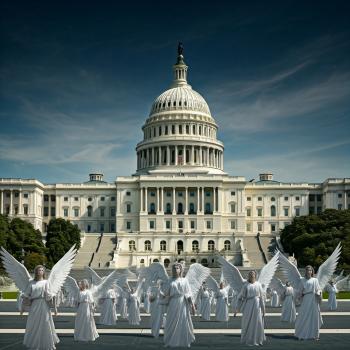
The oldest heresies in Christianity have been those that have denied the body—Christ’s body, our bodies. Gnosticism is a name that applies to a good many of them, Docetism another. The idea is that God is too great to have taken on a human body and that the material realities of our body are too lowly to be welcomed into the eternal kingdom of God. The Docetists said that Christ appeared to be human but that he didn’t have real flesh and bones—he was human image without human substance. The Gnostics believed that the body was the source of evil, a trap that we would move beyond in order to move into the highest emanations of a pure and disembodied Wisdom.
These heresies were and are popular and attractive because resonate—we often experience our bodies as a trap. Who hasn’t wished that they could be free of their body at some point? We have all had illnesses that have left us wanting to be free of our flesh. We all have imperfections and limitations in our bodies that feel like they are holding back the spiritual sides of ourselves. “The spirit is willing, but the flesh is weak” is among our favorite verses.
These body problems, this hatred of the physical realities through which we are manifest in the world, are true not only of our bodies as individuals, but also of our part in Christ’s body—the church. Many of us would be loath to use Docetic language when talking about the body of Christ manifest in Jesus of Nazareth, but we are effectively Docetists in the way we view the church as the body of Christ here and now. We may say that we embrace the doctrine of the Incarnation, but we deny the Incarnation as now present—in the community of the faithful. Many of us are, whether we know it or not, ecclesial Gnostics—we want to live away from the body of Christ, physically present in the community of faith. Instead of the body we seek to discover some more pure form of Christianity, a form that meets all of our ideals and hopes and dreams—a form of faith that could never be contained in the troubled world of church bodies which inevitably mean committees, budgets, institutions, sin, disease, people we just don’t like or who are just so wrong.
Gnosticism is a problem when applied to our personal bodies—it denies the goodness of the physical world, the creation, our creatureliness. More deeply it creates a kind of spirituality that is the perfect compliment to a consumerist culture that is focused on removing every boundary of the physical in order to gain an ever more efficient stream of little pleasures that never give us any lasting satisfactions. And in the same way Gnosticism is a problem when applied to the body of Christ in the church—it is a denial of the way Christ is incarnate in the world now. This denial leaves us open to a Choose Your Own Adventure kind of religion that never draws us up short with our limits, our dependencies, our need for others.
We would all like to have bodies without disease, bodies without limits, bodies that never give us any aches or pains or troubles. We would all like to be in churches that never have problems, that always do what is right, that never force us into difficult discernments and always preach and teach us exactly what we think and believe. But we cannot live in such realities if we want to live into the reality of the Incarnation, which says again that the body, personally and ecclesially, is good though fallen. Christ came in the body to remind us of the goodness of our bodies, Christ left us the remembrance of his presence in the bread and wine of Eucharist to remind us of the goodness of creation, Christ became present again in the world through the church to teach us that we cannot be disciples without the community of the church.
Yes, sometimes our bodies give us trouble. Sometimes we even have to under go serious treatments—surgery and chemo for cancers that have spread and hearts that have failed. Sometimes bodies die. But such realities cannot lead us to deny the body and its goodness, that our body really is a gift. As troubled as our church bodies might be we cannot ignore that Jesus came to form a community and that we can only be Christ’s presence in the world through a community. We exist through our bodies and in our bodies, through our communities and in our communities—it is time to start celebrating this in all its troubled glory rather than trying to escape for some pure spiritual state.















